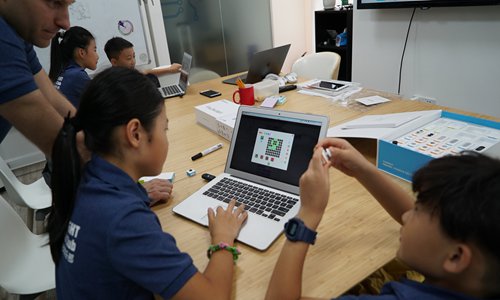HOME >> CHINA
Top science institute suspends programmer for copying language
By Zhang Han Source:Global Times Published: 2020/1/19 14:53:40

Children are learning programming at the Blue Light SciTech Club. Photo: Courtesy of Makeblock
China's top science body suspended a researcher Sunday after the coding language he claimed as 100 percent original was found in fact to be based on a Dutch programmer's language.The Chinese Academy of Sciences (CAS) institute of computing technology announced via its website that Liu Lei's programming education product for youngsters was not completely developed by his team as he told the media but was actually based on the Python computer language.
Created by Guido van Rossum from the Netherlands and first released in 1991, Python is available for multiple operating systems and suitable for developing Artificial Intelligence (AI).
Liu's behavior included misconduct, fraud and false statements, the institute said, noting that they had suspended Liu pending an investigation and felt sorry about the negative impact caused by the incident.
In an interview on Wednesday Liu claimed credit for developing a brand new programming language. The language was designed, developed and implemented by his team, Liu said.
"We have truly mastered the core technology."
But other programmers challenged Liu's claim, saying Mulan was Python "in a new coat."
Mulan merely added an interpreter to the Python system and the core coding process was the same as Python, according to one internet user on China's Quora-like Zhihu platform.
Liu published an apology in China Science Daily for exaggerating the originality of his Mulan language, which actually copied code from Python.
He admitted Mulan was an adaption of Python targeted at primary and middle school students.
Liu had earlier claimed Mulan was designed to improve operating efficiency, lower costs and might contribute to the Internet of Things.
Liu said he was sorry for damaging the reputation of CAS and its institute of computing technology where he worked.
Experts doubted Mulan's value.
The value of a coding language depends on whether it can be actually used to write programs, a PhD candidate of computer sciences from Stanford University, told the Global Times on condition of anonymity. He asked not to be named.
It was hard to say how many changes were made to Python based on accessible information, the candidate said, but Mulan was probably of little practical value if the changes were not fundamental.
A download link to the Mulan program was unavailable at its parent company website as of press time.
In an earlier interview, Liu said that programming software, teaching materials and equipment based on Mulan are being used in some 700 primary and middle schools in 18 provinces and municipalities in China.
Ambitious Chinese parents have been investing in their children studying computer programming, the key to the future development of AI.
Net users noted that early-age learning of Mulan was pointless as students would still later have to learn Python if they wanted to become professional computer programmers.
In 2018, Beijing-based web browser startup Redcore claimed they had developed an innovative browser and raised $36 million in funding, but later admitted their browser was based on Google Chrome, media reported.
RELATED ARTICLES:
Posted in: SOCIETY